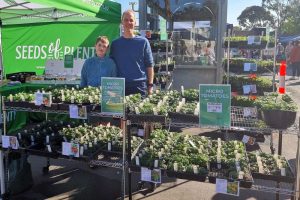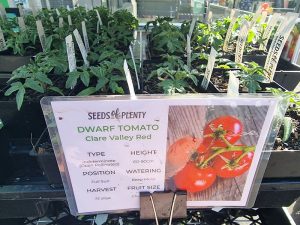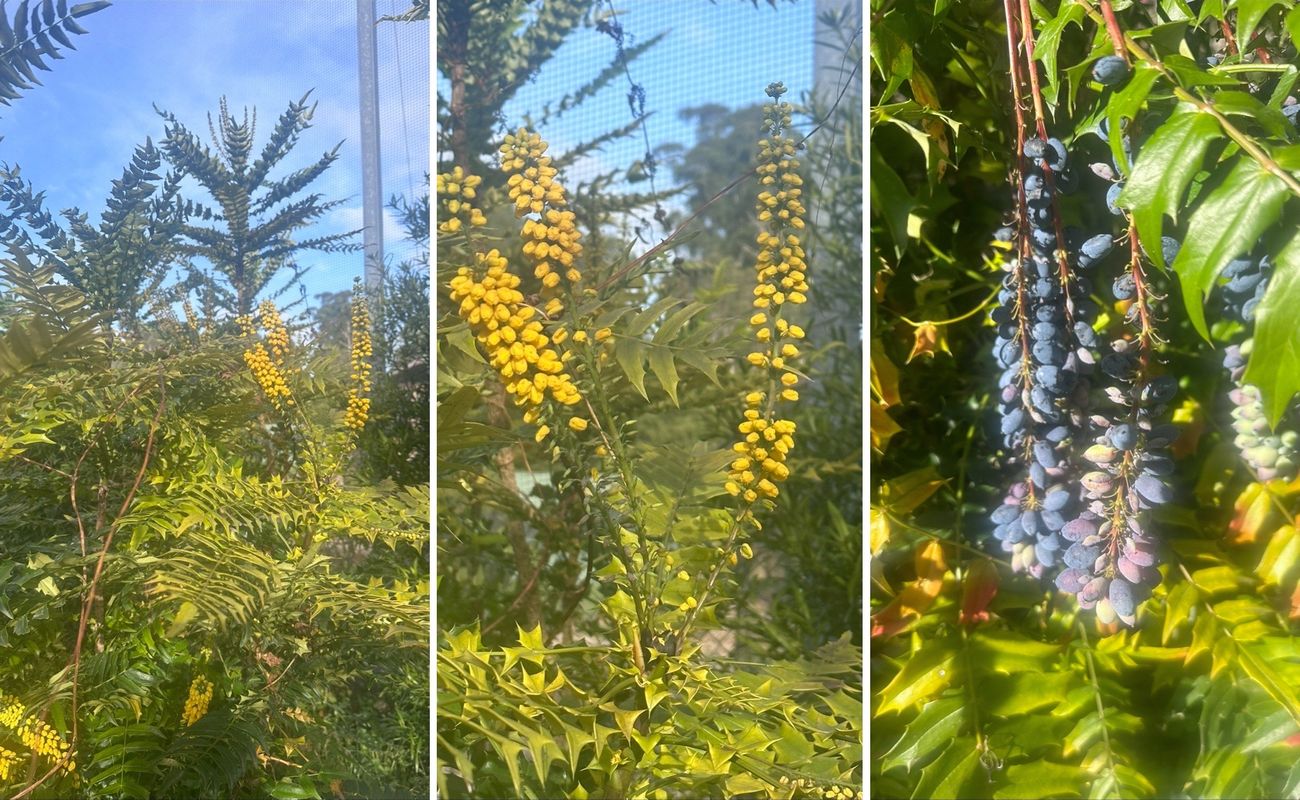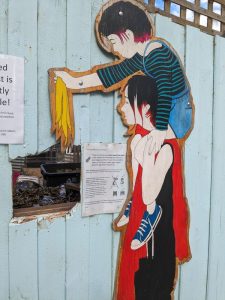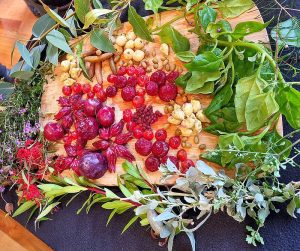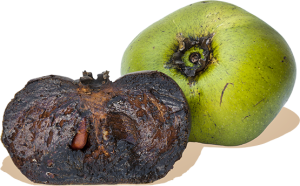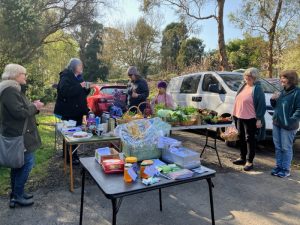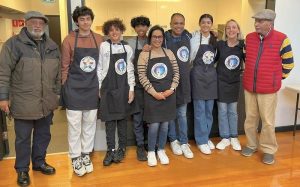Thanks to the people who have contributed to this week’s newsletter: Dan Ross, Megan Goodman and Robin Gale-Baker.
Foliar spraying (by Robin Gale-Baker)
Foliar sprays, such as Seasol or Maxicrop, are ones that are primarily absorbed through the leaves of a plant. They contain trace elements and minerals that are vital for the health of the plant and often not available from the soil. They are made from seaweed.
Foliar sprays are not nitrogenous. For a nitrogen-based liquid, buy Charlie Carp. Be aware that amendments containing primarily trace elements and minerals cannot be substituted for nitrogenous ones or vice versa. Rather, they do very different jobs. Read my previous article on this subject.
It is important to apply foliar nutrients by spraying rather than using a watering can. Spraying produces a mist of tiny droplets that adhere to the leaves and allow the plant to absorb maximum trace elements and minerals.
Foliar sprays should be applied to vegetables about every 3 weeks throughout spring and summer, and on garlic from August onward. Crops such as broccoli, cauliflower and cabbage like a regular dose during the winter months.
Want any more tomato or capsicum seedlings?
If you want any more tomato or capsicum seedlings, you may wish to consider buying them from Eltham-based Seeds of Plenty at Eltham Farmers’ Market on either Sunday, 1st October (i.e. next Sunday) or Sunday, 15th October. They have a huge range of tomato seedlings; for example, when I went to see them, they had the following varieties for sale:
– – – – – – – – – – – – – – Standard size – – – – – – – – – – – – – – |
Dwarf |
Micro |
||
| Alices Dream Amish Paste Atomic Grape Atomic Sunset Beefsteak Berkley Tie Dye Black Beauty Black Cherry Black Russian Blue Gold Berries Brandywine Chocolate Stripes Costoluto Florentino Dancing With Smurfs |
Giant Tree Green Zebra Grosse Lisse Ice Indigo Rose Karma Apricot Karma Purple Multiflora Lucid Gem Midnight Sun Mint Julep Oxheart Pineapple Prosperity Red Current |
Red Pear San Marzano Santorini Sugar Lump Thai Pink Egg Tigerella True Colours White Beauty |
Banana Toes Bendigo Moon Bendigo Rose Clare Valley Red Geranium Kiss Golden Gypsy Kookaburra Cackle Metallica Pepper Like Stripe Saucy Mary Shadow Boxing Sneaky Sauce Striped Antho Uluru Ochre |
Bonsai Fat Frog Little Red Riding Hood Micro Tom Orange Hat Regina Yellow Window Box |
Says Dan Ross, the owner of Seeds of Plenty: “I really love growing all these different tomatoes and am really happy to be selling them and actually meeting customers.”
This is the first year that Seeds of Plenty have grown and sold seedlings but they have been selling vegetable and other seeds online for many years. Their range is huge, covering most vegetables and herbs and, within this, many different varieties of each.
Another new repair cafe
North Carlton. 2nd Saturday of each month, 10am-midday. Book your slot. North Carlton Railway Neighbourhood House, 20 Solly Avenue, Princes Hill.
That makes a total of 13 repair cafes on our map of North East Melbourne.
What seeds to plant in October
Here is a list (see the planting guide for more detail):
CucurbitsCucumber |
Other warm season veggiesBeans |
Leafy greensLettuce |
RootsBeetroot |
Other veggiesAsparagus |
Compared with September, the solanums (capsicum, chilli, eggplant and tomato), basil and coriander drop out of the list, whilst the cucurbits (cucumber, gourd, pumpkin, rockmelon, watermelon and zucchini) stay in. Note, however, that these lists are the months that it is ideal to plant particular seeds and that you can sometimes plant in other months. So, for example, if your tomato seeds didn’t germinate in September, it’s better to try again in October (or buy some seedlings) rather than face the prospect of no homegrown tomatoes.
Helen Simpson has previously written ‘how to grow’ articles for us about many of the warm season veggies, namely: basil, chilli, cucurbits and tomatoes. Robin Gale-Baker has previously written about how to grow eggplants and capsicums, parsnips and potatoes. And Helen has written more generally about Spring veggie garden preparation.
Meg’s garden this month (by Megan Goodman)
It is time to blow the dust off the outdoor furniture, brush of the cobwebs and get ready for Spring. The grass is growing strongly but so are the weeds. I really need to get onto the weeding and spring cleaning. This leaves little time for the veggie patch but I have been emptying the herb pots, refreshing the potting mix and starting new seeds and seedlings ready for Spring growth.
It is so tempting to buy when you see the tomato seedlings already stocked in the local nurseries- but it is still too early in North East Melbourne. I am testing my patience and potting on my seedlings under cover. Along with the tomato seedlings, there is also the sparkle of Christmas decorations that have started to be displayed in store. Time to soak all my leftover packets of dried fruit to make a traditional Christmas fruit cake or a small pudding.
Small Christmas pudding
300g mixed dried fruit of your choice (use any leftovers you have)
100ml alcohol or orange juice
100g dark brown sugar
75g butter
100g plain flour
60g breadcrumbs
½ teaspoon baking powder
1 egg and one egg yolk
1 teaspoon mixed spice
1 teaspoon cinnamon
½ teaspoon, grated
nutmeg
1 green apple, grated
1 tablespoon golden syrup
Soak the fruit in the alcohol or juice at least overnight but preferably a few days.
Beat the butter and sugar then add the egg and golden syrup. Sift over all the dry ingredients and then add the breadcrumbs. Add the fruit and apple. Mix well to combine. Spoon into your pudding bowl and cover well with foil tying it down.
Steam for at least 3 hours (place a pudding bowl in a large pot in water and keep topped up to about two thirds). Alternatively, use your slow cooker (about 8 hours). Remove and replace foil tightly before storing in a cool dry place.
Read more of Megan recipes on our website.
The Melbourne ‘Local Food Connections’ community radio show
This upcoming Sunday’s episode will feature Angelo Eliades talking about spring planting. Listen on 3CR (855 AM) on Sunday morning, 10-10.30am, by tuning into either the station (855 AM) or its livestream.
Audio recordings of previous episodes are available on their website.
Mitcham Community Meal
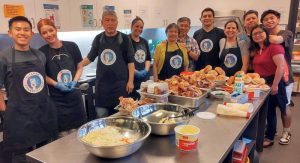 Mitcham Community Meal provides a free community dinner every Sunday evening, where each meal is cooked by a different local community group. During September, the cooking teams were Belmore Road Church of Christ (see photo right), Team Random, Team Terrific and Vermont Girl Guides. Look at some photos of these teams, plus those of previous teams.
Mitcham Community Meal provides a free community dinner every Sunday evening, where each meal is cooked by a different local community group. During September, the cooking teams were Belmore Road Church of Christ (see photo right), Team Random, Team Terrific and Vermont Girl Guides. Look at some photos of these teams, plus those of previous teams.
Some things for you to read
An article on gardening habits by Duncan Cocking
Five habits of good gardeners. The five habits are:
- Watering your plants.
- Observing your garden.
- Fostering connection.
- Composting.
- Planning.
An article on olive harvesting by Angelo Eliades
Harvesting olives, a guide on when and how to pick them.
Read more food-related articles by Angelo.
Which link was clicked most times in the last newsletter?
The most popular link in the last newsletter was Angelo’s article on why bean plants develop white spots on their leaves.
 Joke (or pun) of the week
Joke (or pun) of the week
A parent teaching their child some arithmetic asks: “if I had 4 chocolate treats and you asked for one, how many would I have left?”
The child replies: “As it is you, you’d probably still have 4.”
Regular activities over the coming week
Farmers’ and other food markets
- Friday: Community Grocer, Carlton and Farm Raiser farmgate (Bellfield).
- Saturday: Carlton, Coburg and Farm Raiser farmgate (Bellfield).
- Sunday: Alphington, Eltham and Heathmont.
- Tuesday: Community Grocer, Fitzroy.
- next Wednesday: Really Really Free Market (Coburg).
Food swaps
- Saturday: Brunswick East.
- Sunday: Blackburn, Montmorency and Regent (Reservoir).
Community gardens
- Thursday: Buna (Heidelberg West), Diamond Valley Library (Greensborough), Edible Hub (Hurstbridge), SEEDs (Brunswick) and Whittlesea.
- Friday: Reynard Street (Coburg) and West Brunswick.
- Saturday: Bellfield, Links (Lalor), Macleod and Thrive (Diamond Creek).
- Sunday: Fawkner Food Bowls, Northcote Community, Pentridge (Coburg) and Regent (Reservoir).
- Monday: Panton Hill, SEEDs (Brunswick) and Whittlesea.
- Tuesday: Doncaster Hill and Watsonia.
- Next Wednesday: Bellfield, Eltham Neighbourhood House, Macleod, Newton Street (Reservoir), Span (Thornbury) and Sylvester Hive (Preston) .
Not food-related but interesting
Loving our lizards through reptile-friendly gardening; Monday, 30th October, 7-8.30pm; free; Nunawading.
Ecologist David De Angelis will discuss how you can attract lizards to your garden. He will cover the features of a good lizard longue and the types of lizards we are likely to find locally. This event will be streamed live but not recorded.
Upcoming face-to-face events – not cooking
Summer veggies workshop (garden tour); Saturday, 14th October, 1-4pm; free; Park Orchards.
Visit a large suburban garden including around 500 orchids, 100 bonsai and a large veggie garden. Plant your own punnets of summer-growing vegetables under the guidance of experienced members of Waverley Garden Club. Organised by Waverley Garden Club.
Community soup night; Wednesday, 1st November, 5-7.30pm; free; Preston.
Share some soup, hear an update from the farm and taste what’s in season on Wurundjeri Country. Organised by Oakhill Food Justice Farm.
Nutrition and menopause – nourishing the transition; Wednesday, 8th November, 6.45-8.30pm; free; Hawthorn.
Understanding how to nourish your body during oeri-menopause and menopause is essential to positive health benefits through menopause and beyond. Join them for a free pilates session from 6.45pm followed by an information session at 7.30pm where a local dietitian will discuss: metabolic change at mid-life and your diet; nutrition for your heart and bone health; foods to support hormonal health; and where to access nutrition resources and support.
Grounded at TarraWarra; Friday, 10th November, 3-6.30pm; $88 ($25 per hour); Yarra Glen.
Begin in the vineyards, planted 40 years ago, for a guided look through the estate’s blocks of chardonnay and pinot noir. Then visit the TarraWarra Museum of Art, where new artworks from the Netherlands, Colombia, Indonesia and Wurundjeri Country are on display in an exhibition called The Soils Project. Gülsen Özer will then join you for a creative movement workshop, before TarraWarra winemaker Sarah Fagan leads you underground to the estate’s cellar door for some wine tastings. Finally it will be time to enjoy cheese and charcuterie, along with a glass of your favourite estate wine.
Chardonnay + fromage; Saturday, 11th November, midday-3pm; $60 ($20 per hour); Warrandyte South.
The ticket price includes a 75ml pour of 4 wines plus 4 matched cheeses. You will explore 4 vintage chardonnays from Rob Dolan Wines’ plus 4 matched cheeses from Stone & Crow Cheese Company. Meg Brodtmann will handle the pairings.
Urban wine walk; Saturday, 11th November, midday-4pm; $82; Fitzroy.
This is a self-guided wine tasting experience, where you choose the order in which you visit the various venues. The ticket includes complementary tastings, a $10 food voucher, a $25 voucher for wine orders and a tasting glass. The participating venues and winemakers: Bonny Bar with A.R.C. Wines; Ichi Ni Nana with Susuro Wines; La Vineria with Pizzini Wines ; Lost Boys Bar with Stappa Wines; Near & Far Bar with Konpira Maru; Odd Culture with Pool Wines; The Belfry with Meredith Wine; The Fitz Café & Rooftop with Alles Klar Wines ; and The Rochey with Patch Wines.
Awara open garden; Sunday, 12th November, 10-11.30am; $20 ($14 per hour); Pascoe Vale South.
Join Leila Alexandra, from Barefoot Food Gardens, on a tour of her 840m2 rental property. Leila will discuss how the lawn was transformed into a productive paradise, and the philosophy of forage gardening and how it translates in practice. Enjoy a chat and garden tea post tour.
Installing drip line irrigation with Angelo Eliades; Sunday, 12th November, 1-3pm; $15; Macleod.
Learn how lay out and install drip line irrigation systems, including: how drip irrigation works; what all the irrigation bits and pieces on sale are and what they do; the different ways to lay out irrigation systems; how to connect the pieces together to construct a working watering system; and how to use and repair these irrigation systems. Presenter: Angelo Eliades. Organised by Sustainable Macleod.
Food photography; Sunday, 12th November, 2-5pm;$109 ($36 per hour); Eltham.
This class is for food bloggers, bakers or restaurant/cafe owners. It will focus on taking great images of food using your own, or easily obtainable, equipment. It will cover such aspects as the right lens, composition, exposure, lighting and software.
Smart storage to reduce food waste workshop; Thursday, 16th November, 6.30-7.30pm; free; Ringwood.
This workshop will cover: tips to use your fridge and freezer wisely, to prolong the life of your food; pantry storage to minimise waste; know the difference between ‘use-by’ and ‘best before’ dates; storing and maximising herbs; and what you can do with commonly leftover ingredients. Presenter: Kirsty Bishop-Fox from Sustainability Pathways.
Kitchen medicine – garden farmacy; Saturday, 18th November, 10am-2.30pm; $120 ($27 per hour); CERES.
What you will learn: an introduction to herbal medicine making; plant identification; guidelines for foraging and wild-crafting; medicinal uses for plants; and how to introduce medicinal herbs into the kitchen for medicine. What you will get: a remedy and a seedling. Take a walk through the CERES garden beds and bring the wisdom of traditional herbal medicines into a modern context. You will explore traditional and modern uses of the plants and how to introduce these plants into the kitchen as medicine. Presenter: Naabi Methe.
Working with water with Dan; Saturday, 18th November, 10am-3.30pm; $15 ($3 per hour); Edendale.
The workshop will explore the human relationship with water, how it fits within our ecology and moves through the land. It will cover: principles and patterns for catching, storing and distributing water; reading water’s behaviour in the landscape; how to work with rainwater, grey water and mains supplies to bring more life to our surroundings; and principles and design approaches to improve your management of water at home. It will also involve walking, talking and designing to explore living examples of water management around Edendale’s buildings, gardens and nearby waterways. Presenter: Dan Milne.
Mushroom farm tour; Saturday, 18th November, 2-2.30pm; $27 ($54 per hour); Alphington.
Go on a walk-through tour of The Mushroomery, showing how the farm operates and how mushrooms are grown. Due to potential fungal contamination, it is important that you wear very clean clothes. Organised by The Mushroomery.
In September
- Buzzing around; Thursday, 28th September, 11am-midday; free; Edendale.
- Growing mushrooms at home; Saturday, 30th September, 10.30am-1pm; $135 ($54 per hour); Alphington.
In October
- Growing nutrient dense food; Sunday, 1st October, 10am-3pm; $120 ($24 per hour); CERES.
- Keeping backyard chickens; Wednesday, 4th October, 6.30-8pm; free; Doncaster.
- Keeping chickens with Ella Boyen; Wednesday, 4th October, 6.30-8.30pm; free; Doncaster.
- Diabetes and healthy eating for older adults; Thursday, 5th October, 11am-12.30pm; free; Lalor.
- Urban foraging 101; Saturday, 7th October, 10am-midday; free; South Morang.
- Marketing your product; Saturday, 7th October, 10am-2pm; $125 ($31 per hour); Northcote.
- Queensland fruit fly – what you can do; Saturday, 7th October, 10.30-11.30am; free; Lilydale.
- Edible weeds walk; Saturday, 7th October, 10.30am-12.30pm; $30 ($15 per hour); Coburg.
- Edible weeds walk; Saturday, 7th October, 1.30-3.30pm; $30 ($15 per hour); Coburg.
- Croxton / Marra Guwiyap Community Garden open garden; Sunday, 8th October, 11am-2pm; free; Northcote.
- Spoil to soil; Monday, 9th October, 9.30am-12.30pm; free; Brunswick.
- Rosés from around the world; Tuesday, 10th October, 6-8pm; $65 ($33 per hour); Abbotsford.
- Reducing food waste at home; Wednesday, 11th October, 5-7pm; free; Preston.
- Growing food at home (10 sessions); Consecutive Thursdays from 12th October, 9.30am-1pm; $93 ($3 per hour); Heidelberg West.
- Archie Rose x Cheese Culture x Moon Dog pairing experience; Thursday, 12th October, 7.30-9.30pm; $84 ($42 per hour); Preston.
- Urban food gardening (10 sessions); on consecutive Fridays, starting 13th October, 9.30am-1.30pm; $50 ($1 per hour); Brunswick.
- Kevin Heinze GROW Spring Fair (Coburg); Saturday, 14th October, 9am-3pm; gold coin; Coburg.
- Kevin Heinze GROW Spring Fair (Doncaster); Saturday, 14th October, 9am-3pm; gold coin; Doncaster.
- Citrus tree pruning workshop; Saturday, 14th October, 10am-midday; free; Bundoora.
- Growing great tomatoes; Saturday, 14th October, 10am-3pm; $120 ($24 per hour); CERES.
- Edible weeds walk; Saturday, 14th October, 10.30am-12.30pm; $30 ($15 per hour); Coburg.
- Rushall Community Garden open day; Saturday, 14th October, 12.30-3pm; free; Fitzroy North.
- Summer veggies workshop (garden tour); Saturday, 14th October, 1-4pm; free; Park Orchards.
- Composting, worm farming and Bokashi; Saturday, 14th October, 1.30-2.30pm; free; Ringwood.
- Edible weeds walk; Saturday, 14th October, 1.30-3.30pm; $30 ($15 per hour); Coburg.
- Your happy vegetable garden memory turned to art; Sunday, 15th October, 1.30-3.30pm; free; Reservoir.
- Unwrapped – food and beverage quick bites; Tuesday, 17th October, 7-9.15am; free; Epping.
- Composting, worm farming and Bokashi workshop; Tuesday, 17th October, 10.30am-midday; free; Bayswater North.
- Awara open garden; Sunday, 22nd October, 10-11.30am; $20 ($14 per hour); Pascoe Vale South.
- DIY mushrooms; Sunday, 22nd October, 10am-4pm; $175 ($29 per hour); CERES.
- Edible weed walk; Sunday, 22nd October, 10.30am-12.30pm; free; Heidelberg West.
- Watch it grow; Tuesday, 24th October, 4-5pm; free; Edendale.
- Reducing food waste at home; Wednesday, 25th October, 5-7pm; free; Preston.
- Urban food gardening (8 sessions); consecutive Thursdays starting 26th October, 10am-2.30pm; $80 for all 8 sessions; Edendale.
- Community garden tour; Saturday, 28th October, 10am-2.30pm; $10; Banyule.
- Home brewing; Saturday, 28th October, 10am-2.30pm; $100 ($22 per hour); CERES.
- Organic vegetable gardening; Saturday, 28th October, 10am-3pm; $120 ($24 per hour); CERES.
- Foraging workshop; Saturday, 28th October, 1-3pm; $10; Ringwood.
- Edible weeds; Sunday, 29th October, 10am-midday; $60 ($30 per hour); CERES.
In November
- Community soup night; Wednesday, 1st November, 5-7.30pm; free; Preston.
- Edibles in small spaces with Duncan Cocking; Wednesday, 1st November, 6.30-8.30pm; free; Doncaster.
- Basic inoculation workshop; Saturday, 4th November, 2-4pm; $87 ($44 per hour); Alphington.
- Reducing food waste at home; Wednesday, 8th November, 5-7pm; free; Preston.
- Nutrition and menopause – nourishing the transition; Wednesday, 8th November, 6.45-8.30pm; free; Hawthorn.
- Grounded at TarraWarra; Friday, 10th November, 3-6.30pm; $88 ($25 per hour); Yarra Glen.
- Backyard beekeeping basics; Saturday, 11th November, 11am-1pm; $80 ($40 per hour); CERES.
- Chardonnay + fromage; Saturday, 11th November, midday-3pm; $60 ($20 per hour); Warrandyte South.
- Urban wine walk; Saturday, 11th November, midday-4pm; $82; Fitzroy.
- Setting up a worm farm; Saturday, 11th November, 2-3.30pm; free; Edendale.
- Awara open garden; Sunday, 12th November, 10-11.30am; $20 ($14 per hour); Pascoe Vale South.
- Installing drip line irrigation with Angelo Eliades; Sunday, 12th November, 1-3pm; $15; Macleod.
- Food photography; Sunday, 12th November, 2-5pm;$109 ($36 per hour); Eltham.
- Introduction to horticultural permaculture (4 sessions); consecutive Wednesdays starting 15th November, 10am-2.30pm; $50 for all 4 sessions; Edendale.
Regular events
- Beekeeping workshop; roughly once a month on Saturdays, 1-3.30pm; $85 ($34 per hour); Brunswick East.
- Carlton aperitvio food tour; every Friday, 5-7pm; $139 ($70 per hour); Carlton.
- Classic cocktails; various Tuesdays, 7-10pm; $70 ($23 per hour); Fitzroy.
- Edible Forest tours; every Friday and Saturday, 11am-1pm and again at 1-3pm; $25 ($13 per hour); Dixons Creek.
- Eltham trails (walking food tour); various Saturday mornings and Thursday evenings; $65 ($22 per hour); Eltham.
- Flavours of Coburg food tour; 3rd Saturday of each month, 10am-1pm; $65 ($22 per hour); Coburg.
- Gin making masterclass; most Saturdays, 10am-1pm; $175 ($58 per hour); Nunawading.
- Gin masterclass; most Saturdays and Sundays, midday-1pm; $80 ($80 per hour); Eltham.
- Ratio Cocoa Roasters behind the scenes chocolate factory tour; various Fridays and Saturdays; $20 ($14 per hour); Brunswick.
- Spoon carving workshop; various Saturdays and Sundays, 10am-1pm; $130 ($43 per hour); Coburg North.
- Truffle workshop at Ratio Cocoa Roasters; 3rd Sunday of each month, 11am-1pm; $75 ($38 per hour); Brunswick.
- Wine tasting masterclass; Saturdays, 3-5pm; various prices; Northcote.
Upcoming face-to-face events – cooking
Japanese cooking class – curry; Friday, 13th October, 1-2.30pm; $15; Greensborough.
Chika will demonstrate how to make traditional Japanese curry. Organised by Greenhills Neighbourhood House.
Christmas cake workshop; Saturday, 11th November, 1.30-3pm; $56 ($38 per hour); Lower Templestowe.
Tish will show you how easy it is to make your own Christmas cake. Take a cake tin (20cm square or round tin) to take your cake home. Organised by Living And Learning @ Ajani.
Gingerbread house workshop; 2 occurrences on Tuesdays, 14th and 21st November, 7-8.30pm; $30 ($20 per hour); Greensborough.
Ros and Trudy will show you how to construct your own, decorated gingerbread house. You will then take it home. All materials will be provided. Organised by Greenhills Neighbourhood House.
Japanese cooking class – shiratama mochi rice sundae; Wednesday, 15th November, 1-2.30pm; $15; Greensborough.
Chika will demonstrate how to make shiratama mochi rice sundae. Organised by Greenhills Neighbourhood House.
Dumpling making workshop; Friday, 17th November, 6.30-8.30pm; $75 ($38 per hour); Park Orchards.
Make Chinese dumplings from scratch. The dough you prepare can be used for either boiled dumplings (shui jiao) or potstickers (guo tie). Then make vegetarian dumplings. Facilitator: Miki. Organised by Park Orchards Community House.
In September
- Cheesy stuffed arancini (for children); Thursday, 28th September, 11am-midday; $15; Lilydale.
In October
- The basics of pickling (2 sessions); on Sundays 1st and 8th October, each 11am-2pm; $74 ($12 per hour); Forest Hill.
- Jaclyn Crupi – pasta love; Wednesday, 4th October, 6.30-8pm; free; Fitzroy North.
- The cook program (9 sessions); on Thursdays starting 5th October, 9.30am-1.30pm; $50 ($1 per hour); Brunswick.
- Fermenting vegetables for beginners with Jen Willis; Thursday, 5th October, 7.30-9.30pm; free; Bundoora.
- More than a loaf of bread; Saturday, 7th October, 10am-12.30pm; $51 ($20 per hour); Brunswick.
- Herbal tea workshop with Monique; Saturday, 7th October, 10.30-11.45am; $59 ($47 per hour); Northcote.
- Handmade sobagaki workshop with Rieko Hayashi; Saturday, 7th October, 11am-1pm; $75 ($38 per hour); Fitzroy North.
- Sri Lankan cooking class; Monday, 9th October, 6-8.30pm; $95 ($38 per hour); Surrey Hills.
- Cooking with your grandkids; Tuesday, 10th October, 11am-12.30pm; $10; Hurstbridge.
- Cooking from the pantry (9 sessions); on 9 consecutive Tuesdays from 10th October, 9.30am-midday; $50 ($2 per hour); Lower Templestowe.
- Sourdough basics; Thursday, 12th October, 6.30-8.30pm; $120 ($60 per hour); Collingwood.
- Japanese cooking class – curry; Friday, 13th October, 1-2.30pm; $15; Greensborough.
- Food storage workshop with Open Table; Saturday, 14th October, 2-4pm; free; Carlton.
- Sourdough bread making; Sunday, 15th October, 10am-1pm; $55 ($18 per hour); Panton Hill.
- Soft fresh cheese making including goats cheese; Sunday, 15th October, 10am-3pm; $240 ($48 per hour); CERES.
- FFS … ferment four staples; Sunday, 15th October, 11.30am-4.30pm; $425 ($85 per hour); Fitzroy North.
- Cooking with your grandkids; Tuesday, 17th October, 11am-12.30pm; $10; Box Hill.
- Jaclyn Crupi; Wednesday, 18th October, 2-3pm; free; Northcote.
- Cooking for one (5 sessions); on Thursdays, starting 19th October, 11am-1pm; $50 ($5 per hour); Lilydale.
- Kombucha / Jun M.O.B.; Thursday, 19th October, 6.30-8.30pm; $150 ($75 per hour); Fitzroy North.
- Warm up with no waste cooking; Thursday, 19th October, 7-8.30pm; free; Thomastown.
- Sourdough; Saturday, 21st October, 10.30am-1.30pm; $130 ($43 per hour); Kinglake.
- No waste cooking on an induction cooktop; Saturday, 21st October, 11am-12.30pm; free; Diamond Creek.
- Croquembouche workshop; Saturday, 21st October, 1.30-5.30pm; $134 ($34 per hour); Lower Templestowe.
- Vegan chocolate making; Sunday, 22nd October, 10-11.30am; $80 ($53 per hour); Collingwood.
- Three ways with red curry paste; Sunday, 22nd October, 10.30am-3pm; $190 ($42 per hour); Panton Hill.
- Pizza masterclass with Antonio; Sunday, 22nd October, 11am-2pm; $86 ($29 per hour); Eltham.
- Finger foods to make at home; Tuesday, 24th October, 6-8.30pm; $65 ($26 per hour); Hawthorn.
- Cooking for one; Tuesday, 24th October, 7-8.30pm; free; Eltham.
- Nutrition and food literacy (6 sessions); on Thursdays, starting 26th October, 9.30am-12.30pm; $70 ($4 per hour); Preston.
- Croissants workshop; Saturday, 28th October, 1.30-4pm; $64 ($26 per hour); Lower Templestowe.
- Healthy cooking hacks for families; Saturday, 28th October, 2-3.30pm; free; Lalor.
- Tasty meals; Sunday, 29th October, 2-3.30pm; free; Ivanhoe.
In November
- Macarons workshop; Wednesday, 1st November, 6-8pm; $91 ($46 per hour); Lower Templestowe.
- Growing and cooking with bushfoods; Saturday, 4th November, 10am-3pm; $120 ($24 per hour); CERES.
- Pasta making class with Piera; Saturday, 11th November, 10am-1pm; $140 ($47 per hour); Thomastown.
- Mozzarella, burrata and stracciatella cheese making; Saturday, 11th November, 10am-3pm; $240 ($48 per hour); CERES.
- Christmas cake workshop; Saturday, 11th November, 1.30-3pm; $56 ($38 per hour); Lower Templestowe.
- Vegan cooking Italian style; Sunday, 12th November, 10am-3pm; $120 ($24 per hour); CERES.
- Gingerbread house workshop; Tuesday, 14th November, 7-8.30pm; $30 ($20 per hour); Greensborough.
Regular classes
- Al dente cooking (Italian); most Saturdays, 9am-1pm; $155 ($39 per hour); Chirnside Park.
- BBQ classes; various days and times; $135-150 ($45-50 per hour); Brunswick East.
- Bread making; various Sundays, 8am-2pm; $230 ($38 per hour); Abbotsford.
- Brunswick Kitchen (many different classes); various dates, times and prices but mostly 2½ hours long and $120; Brunswick.
- Chocolate making and pastry classes for children; various days and times; various costs; Yarra Glen.
- Chocolate making workshop; various Thursdays, Fridays and Saturdays; $152 ($38 per hour); Blackburn.
- Chocolate making workshop; various Saturdays and Sundays; $125 ($63 per hour); Box Hill North.
- Juanita’s Kitchen (plant-based); various dates, times and prices; Preston.
- Kombucha brewing workshop; last Thursday of each month, 7-11pm; $49 ($12 per hour); Brunswick.
- La Cucina di Sandra (Italian); various evenings, 6.30-10.30pm; $120 ($30 per hour); Richmond.
- Margot & Montanez (alfajores biscuits); monthly on Sundays, 10am-1pm ; $109 ($36 per hour); Camberwell.
- Nonna & Mum’s cooking class; 4th Thursday of each month, 7-10pm; $24 ($8 per hour); Thornbury.
- Otao Kitchen (many different classes); various dates, times and prices but mostly 3 hours long and $197; Abbotsford.
- Rosa’s cooking classes (Italian); various Saturdays and Sundays, 10.15am-3pm; mostly $165 ($35 per hour); Bundoora.
- Sourdough bread workshop; roughly once a month on Saturdays, 9-11.30am; $185 ($74 per hour); Brunswick East.
- Taiwanese cooking; 1st Saturday of each month, midday-2.30pm; $126 ($50 per hour); Brunswick.
- Tea blending; various Sundays; $75 ($60 per hour); Brunswick.
- The ultimate biscuit class; various Tuesdays, 10am-3pm; $162 ($32 per hour); Blackburn.

